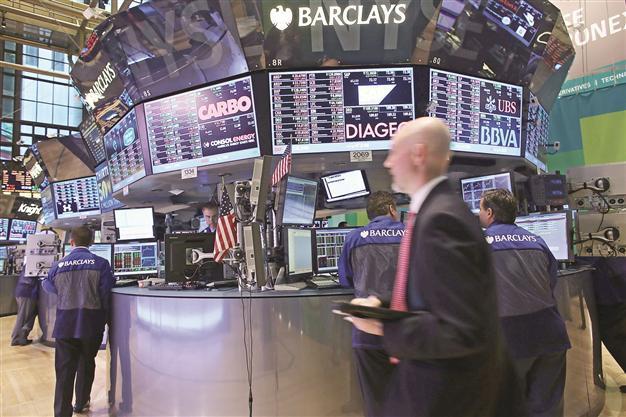Frequent stock trade risky and unfair, say US brokers
WASHINGTON - Agence France-Presse

Traders are seen working on the floor of the New York Stock Exchange. AFP photo
The increasing power of computerized high-frequency trades on U.S. markets has been assailed in Congress as dangerous and unfair, as pressure builds to reel in the powerful industry.
Brokers and industry experts told a congressional panel on Sept. 20 that the flash crash of May 6, 2010, the computer glitch that sabotaged Facebook’s IPO last May, and the Knight Capital software problem that dealt the company a $440 million loss in August, were all examples of the potential for disaster from ultra high-speed, high-frequency trading (HFY).
“US equity markets are in dire straits. We are truly in a crisis,” said David Lauer, a former trader and currently a consultant on markets and high frequency trading at Better Markets Inc.
“While complex systems can often provide elegant solutions to intractable real-world problems, they can also spin out of control in unexpected ways,” he told the Senate Committee on Banking.
High-frequency trading now accounts for 50-70 percent of the volume on markets each day. It has turned most share purchases into acts lasting a second or less, rather than investments that can span days, months and years.
But it simultaneously works in “dark pool” trading operations away from regulated markets, with computers able to work at hyper-speed to exploit price anomalies and take advantage of buyers and sellers trading in traditional ways.
Lauer cited the flash crash of May 2010, when in just minutes the market plunged, losing $1 trillion in value, then just as quickly recovered.
In the interim, though, he said, all liquidity in the market “simply disappeared” as computerized traders pulled out. “Nobody had ever seen anything like it... When more than half of the liquidity in the stock market is able to be pulled from it in a matter
of seconds, dramatically worsening an unstable situation, something is dreadfully wrong.” Lauer said.
the problem is far more common than the most publicized incidents suggest.
‘Mini crashes’“’Mini flash crashes’ occur on a near-daily basis in individual stocks,” he said. The effect is that traditional retail investors have pulled out, frightened by the volatility brought by HFT and the perception of unfair pricing.
“The flight of the retail investor during a period of incredible stock market returns is a sure sign that this exodus is a result of mistrust rather than economic conditions.” Andrew Brooks of brokerage T. Rowe Price told senators “the almost myopic quest for speed has threatened the very market itself.” “There is a growing distrust of the casino-like environment that the marketplace has developed over the past decade. We worry that the erosion of investor confidence can undermine our capital markets, which are so important to the economy.”
